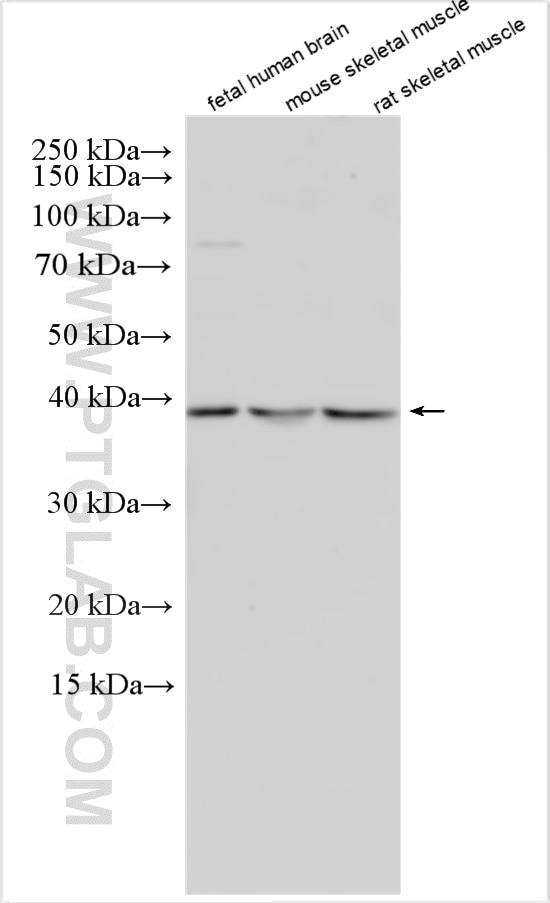Tested Applications
| Positive WB detected in | fetal human brain tissue, mouse skeletal muscle tissue, rat skeletal muscle tissue |
Recommended dilution
| Application | Dilution |
|---|---|
| Western Blot (WB) | WB : 1:500-1:1000 |
| It is recommended that this reagent should be titrated in each testing system to obtain optimal results. | |
| Sample-dependent, Check data in validation data gallery. | |
Product Information
28345-1-AP targets GDF1 in WB, ELISA applications and shows reactivity with Human, mouse, rat samples.
| Tested Reactivity | Human, mouse, rat |
| Host / Isotype | Rabbit / IgG |
| Class | Polyclonal |
| Type | Antibody |
| Immunogen |
CatNo: Ag28831 Product name: Recombinant human GDF1 protein Source: e coli.-derived, PGEX-4T Tag: GST Domain: 65-273 aa of NM_001492 Sequence: LFRRRDPQETRSGSRRTSPGVTLQPCHVEELGVAGNIVRHIPDRGAPTRASEPASAAGHCPEWTVVFDLSAVEPAERPSRARLELRFAAAAAAAPEGGWELSVAQAGQGAGADPGPVLLRQLVPALGPPVRAELLGAAWARNASWPRSLRLALALRPRAPAACARLAEASLLLVTLDPRLCHPLARPRRDAEPVLGGGPGGACRARRLY Predict reactive species |
| Full Name | growth differentiation factor 1 |
| Calculated Molecular Weight | 39 kDa |
| Observed Molecular Weight | 39 kDa |
| GenBank Accession Number | NM_001492 |
| Gene Symbol | GDF1 |
| Gene ID (NCBI) | 2657 |
| RRID | AB_3086045 |
| Conjugate | Unconjugated |
| Form | Liquid |
| Purification Method | Antigen affinity purification |
| UNIPROT ID | P27539 |
| Storage Buffer | PBS with 0.02% sodium azide and 50% glycerol, pH 7.3. |
| Storage Conditions | Store at -20°C. Stable for one year after shipment. Aliquoting is unnecessary for -20oC storage. 20ul sizes contain 0.1% BSA. |
Background Information
GDF1 is a secreted ligand of the TGF-beta (transforming growth factor-beta) superfamily of proteins. Ligands of this family bind various TGF-beta receptors leading to recruitment and activation of SMAD family transcription factors that regulate gene expression. The encoded preproprotein is proteolytically processed to generate each subunit of the disulfide-linked homodimer. Studies in rodents suggest that this protein is involved in the establishment of left-right asymmetry in early embryogenesis and in neural development in later embryogenesis.
Protocols
| Product Specific Protocols | |
|---|---|
| WB protocol for GDF1 antibody 28345-1-AP | Download protocol |
| Standard Protocols | |
|---|---|
| Click here to view our Standard Protocols |
Reviews
The reviews below have been submitted by verified Proteintech customers who received an incentive for providing their feedback.
FH MALLIKARJUNA (Verified Customer) (10-24-2025) | best for WB
|
FH MALLIKARJUNA (Verified Customer) (10-24-2025) | best for western blot
|




